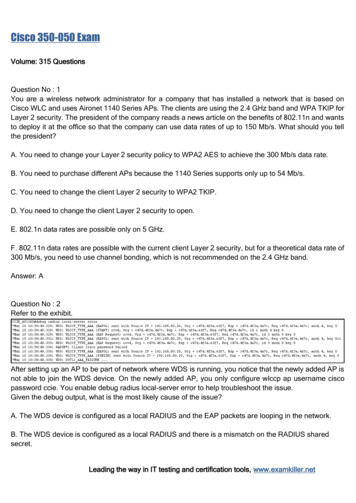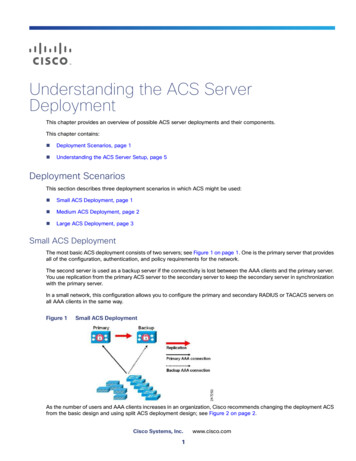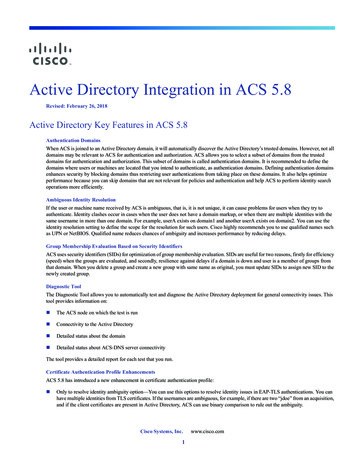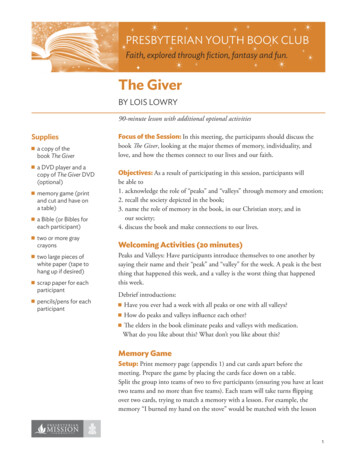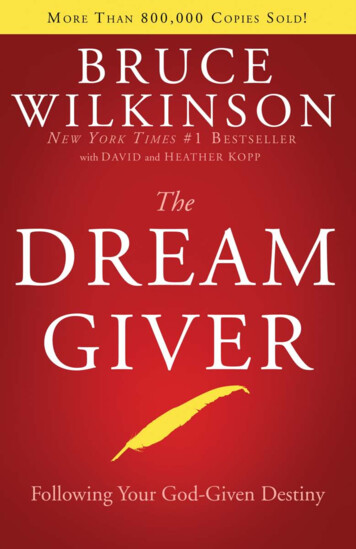
Transcription
THREECHARACTERISTICSOF ACHEERFULGIVER
Theologian Henri Nouwenʼs transformational book, The Spirituality of Fundraising, hashelped many of us reframe our approach to asking donors for money.“From the perspective of the gospel, fund-raising is not a response to a crisis,” he writes.“Fund-raising is, first and foremost, a form of ministry. It is a way of announcing our vision andinviting other people into our mission.”For many churches, large and multi-campus congregations withlarge operating budgets in particular, fundraising can seem a verytouchy subject.Nouwen assures us that fundraising doesnʼt need to feelawkward, desperate, or intrustive. Fundraising is ministry,and Nouwen provides an important Biblical framework forunderstanding a donorʼs relationship to God and money,and perhaps as importantly, the spiritual role of thefundraiser. We, as those seeking funds, have to be confidentin the many ways giving to our ministry will bless and enrichthe giver.He reminds us that weʼre providing an invitation to those with resources to fuel therestoration of all things and advance Godʼs kingdom here on earth. That unifying of theasker and the giver is what Noewen aptly names “conversion” - where unmet need isfulfilled in a unique coming together as part of Godʼs missional call.“Whether we are asking for money or giving money we are drawn together by God, who isabout to do a new thing through our collaboration,” Nouwen writes.This is a sacred space of conversion - where donor and seeker unite. Using Nouwenʼs lensof spiritual fundraising, it becomes clear that what the Bible teaches us about generositypoints to the very best practices that churches and ministries should have in place tosteward donors.2
AUTHENTIC RELATIONSHIPSOne defining characteristic of a cheerful giver is a desirefor community - an authentic relationship with the ministrythey are supporting.In churches, we often first have to reconcile that while Godʼs concern is for the poor, ourcommunities of faith also provide a way for those with wealth to participate in advancingHis Kingdom.Henri Nouwen puts it this way: “The poor are indeed held in the heart of God. We need toremember that the rich are held there too. I have met a number of wealthy people over theyears. More and more, my experience is that rich people are also poor, but in other ways,” hewrites. “Many rich people are very lonely. Many struggle with a sense of being used. Otherssuffer from feelings of rejection or depression. It may seem strange to say, but the rich need alot of attention and care.”Part of our role as Christians fundraising for the gospel is to help create community andauthentic relationships between those who have resources and those who need them.That is ministry.Donors feel best stewarded when they are part of a community and a goal much bigger thanthemselves. In Luke 21:1-4, Jesus compares the widowʼs mite to the rich manʼs gifts —demonstrating that the gifts of all are needed and used in Godʼs economy. This is a well-knownstory — youʼve probably heard or read it many times — yet it never gets old for me as afundraiser. In my world of working with donors and organizations raising needed funds, themost powerful moments are when I hear stories of sacrifice, whether big or small, inpeopleʼs giving.Donors who have hands-on experiences in ministry build an authentic relationship to thechurch and form a community. This can be a unique challenge in large or multi-campuschurches, where hospitality for newcomers (and getting them connected quickly) is rightly afocus. We often see those larger churches taking their loyal donors and tithers for granted - notintentionally, but just not actively creating opportunities for those givers to see their impact andgrow their giving passion.3
AUTHENTIC RELATIONSHIPSCONT.How do churches create that space?1Offer intentional opportunities for donorsto experience the ministries theyʼresupporting.2Ensure youʼre communicating andcelebrating with donors whattheyʼve made possible.3Carve out the time to build communitiesamong those donors. Thank you events,small group experiences, vision trips ortailored missional experiences all can betargeted to the needs of specific groupsof donors and prospects.In todayʼs culture, most generous donors want to give of more than just their financial resources. This isespecially true of younger givers. They want to get their feet on the ground with the causes theyʼre supporting.They want to get their hands dirty. Donors who are also volunteers are more passionate and better advocatesthan those who only give of their financial gifts.Cultivate authentic communities where cheerful givers are assured they are fueling Godʼs mission in the world.“I wonder how many churches and charitable organizations realize that community is one of the greatest giftsthey have to offer. If we ask for money, it means that we offer a new fellowship, a new brotherhood, a newsisterhood, a new way of belonging,” Nouwen writes.4
BUILDING THE KINGDOMWhat sets a cheerful giver apart from the usual donor?One of those characteristics is a passion to participatein building the Kingdom through their resources.Unfortunately, most churches do a less than stellar job in meeting this need for donors. Itʼs a tough truth thatIʼve discovered through several decades of fundraising work.The Biblical call to tithe and to give our first 10 percent to the Kingdom work too often has led churches to takethose members for granted. Weʼre rightly focused on ministry and congregational care, and we comparativelyput very little planning and thought into caring for those actually funding our work. Outside of an annualstewardship campaign, weʼre on autopilot and counting on the loyalty of tithers with little focus on turningthem into passionate donors.When your members are at a social gathering and asked about the philanthropic causes they support, is thechurch at the top of the organizations theyʼll list? If weʼre honest, we know the answer is probably not. I oftenhear major donors talk about the animal shelter or child sponsor program they support, the campaign to giveclean water to a nation in need, and “.oh, and of course, I give to my church” - the afterthought.As the church, we must do a better job demonstrating for givers how they are advancing the Kingdom throughtheir faithful support. Henri Nouwen insists that “fundraising is a very rich and beautiful activity. It is a confi-dent, joyful, and hope-filled expression of ministry. In ministering to each other, each from the riches that he orshe possesses, we work together for the full coming of Godʼs Kingdom.”A little boy offered Jesus his meager lunch in Matthew 14:14-21. He only had a few loaves and fishes, andJesus had 5,000 mouths to feed. But gifts in Godʼs hands can be — and often are — divinely multiplied to meetthe demands of greater works. This is one of the greatest-ever giving stories, a beautiful picture of the faith tosee something profound happen because of your gifts, however humble they might be.5
BUILDING THE KINGDOM“First and foremost, the young man had enough faithto give his own lunch away! He was risking his ownCONT.CHEERFULGIVERSDONATE TOSEE THEIMPOSSIBLEBECOMEPOSSIBLE.provision, his own comfort, in the hope of helpingothers. One boyʼs faith is what set in motion theamazing miracle of Jesus feeding the 5,000.Cheerful givers donate to see the impossiblebecome possible. It happens inside and outside thewalls of our churches each day, and yet, we donʼtoften say thank you or tell our loyal donors whattheir gifts have done to transform lives.Take the time to regularly brainstorm with yourchurchʼs staff about the ministry stories from the“satellite” campuses by being intentional andfeatures in your communications or social media?Depending on your culture, some of that may bepast week or month. Which ones would make greatstrategic in communicating donor impact.Which ones could serve as the centerpiece of asolved by segmenting your communications:thank you letter to your loyal tithers?decide when to leverage the campus pastorʼscommunications to that segment of donors andItʼs important in a large or multi-campus church towhen to celebrate donor impact and projectshold the tension between the “main” campus andacross all your locations.Plan at least one “unexpected” thanks to yourdonors this year - whether itʼs a phone call, email,handwritten card, or a letter, thank them individuallyPLAN ATLEAST ONE“UNEXPECTED”THANKS TOYOUR DONORSTHIS YEAR .for what they are doing to further Godʼs missionthrough your church.“So if we ask for money from people who havemoney, we have to love them deeply,” Nouwenwrites. “We do not need to worry about the money.Rather, we need to worry about whether, throughthe invitation we offer them and the relationship wedevelop with them, they will come closer to God.”6“
DEMONSTRATING IMPACTDonors need relationship and ministry far more than weneed their money.If we donʼt see ministry to the donor as our higher calling, our donors are destined to be mereobjects and the connection between them and our ministry will be sadly unsatisfying.Very early in my career, I was tasked with raising what seemed like an insurmountable amountof money for a ministry without a large donor base. As a young and inexperienced developmentrep, I tackled it head on, filling my calendar with appointments and firing asks at anyone I couldcorner: “Can you give a thousand dollars? Can you give a thousand dollars?” I was functioninglike a desperate man with a gun!At the end of the campaign, I sat exhausted. I had hit the dollar goal, but it was utterlyunsatisfying for me and for those who contributed. Iʼd brought nothing to them, and theirconnection to the ministry was transactional at best.To cultivate cheerful givers in our churches, we have to be committed to demonstrating theirimpact.A donor may give a gift in response to a request like mine, but without a passion for thatministry, he or she will soon find a way to avoid future requests. Follow the trail of a donorʼsmoney over time, and youʼll find the real object of their passion. When you demonstrate care forgivers and are consistently demonstrating the impact of their giving, itʼs almost inevitable thatthose donors will grow more committed to your ministry.Donors of all sizes deserve to know the difference they are making. Henri Nouwen reminds usthat fundraising is all about creating a relationship between those who have resources andthose who need them, in order to advance Godʼs Kingdom.“We will find ourselves begging for money and they will find themselves merely handing us acheck,” he writes. “No real connection has been created because we have not asked them tocome and be with us. We have not given them an opportunity to participate in the spirit of whatwe are about. We may have completed a successful transaction, but we have not entered into asuccessful relationship.”7
DEMONSTRATING IMPACTCONT.Churches can demonstrate the impact of giversʼ investments in their ministry in meaningful andcreative ways. While the impact of some gifts is easier to quantify than others, donors shouldn'tfeel like their weekly or monthly gifts are going to the operational ‘blackholeʼ of the church. Lookcarefully at each section of your budget and tie those expenses to your mission. How many giftsor donors does it take to keep the lights on? To maintain your website or broadcast your serviceonline? To support the staff or replace equipment in your nursery? To repair the roof?If you are in a multi-campus church setting, ask your campus pastors to undertake the sameexercise with their campus budget and staff. The hard truth is that none of our ministries would bepossible without the generosity of our donors, so take the time to dig into how their gifts propelGodʼs Kingdom each week. Doing that work to translate giving to direct impact also gives you“handles” for donors who might increase their tithe or commitment if they knew what a certainlevel of gift helps accomplish.As Nouwen wisely counseled, “If we raise funds for the creation of a community of love, we arehelping God build the Kingdom. We are doing exactly what we are supposed to do as Christians.”It canʼt be transactional: Nurturecheerful givers by helping them seethe good they are doing day in and dayout for your church and its ministries.8
Choosing the Right Ministry PartnerThe know-how you need from experts you trust.ACS Technologies is the original pioneer of Church Management Software (ChMS). We arefirmly dedicated to serving local churches all over North America by providing the best-in-classministry software and service solutions that help you fulfill Christ’s mission for your Church.Tools and support to strengthen churches.We build great software, but we don’t stop there. We have a “service-first” approach that trulysets us apart. With hundreds of dedicated support and consulting personnel, your staff can reachour team 24/7. We’re in your corner to help you with the ministry challenges you face every day.Ideas and solutions powered by integrity.Integrity is real for us, and it means consistently being faithful stewards by doing the rightthing for church success. We have earned the trust of pastors, church staff, congregants, ouremployees, and colleagues for over 40 years.A plan to meet your needs and move your ministry.We’re not just interested in satisfied customers. We see ourselves as your real ministry partnerand will work with you to make disciples that will last for an eternity. We’re excited to talk aboutyour goals, create a plan together, and set you up with the software, service, and resources youneed.We believe in YOU!ACS Technologies believes in the local church. Over 75% of our team has experience serving intheir local churches. We know firsthand that serving the Church means serving people, and wetake seriously our commitment to helping ministries like yours achieve their God-givenmandate - to make disciples in their communities, states, and across the world.Let’s TalkWe know the challenges of switching or implementing new technology and how that can beintimidating. But we also know the unbelievable changes that have happened within churchesthat have partnered with us for their ministry needs. Let’s connect and see how we can assistyou in the greatest thing you do - grow God’s Kingdom.1-844-467-3256solutions@acst.com180 Dunbarton Dr, Florence, SC 295011021 Copyright ACS Technologies Group, Inc.
One defining characteristic of a cheerful giver is a desire for community - an authentic relationship with the ministry they are supporting. In churches, we often first have to reconcile that while Godʼs concern is for the poor, our communities of faith also provide a way for those with wealth to participate in advancing His Kingdom.

